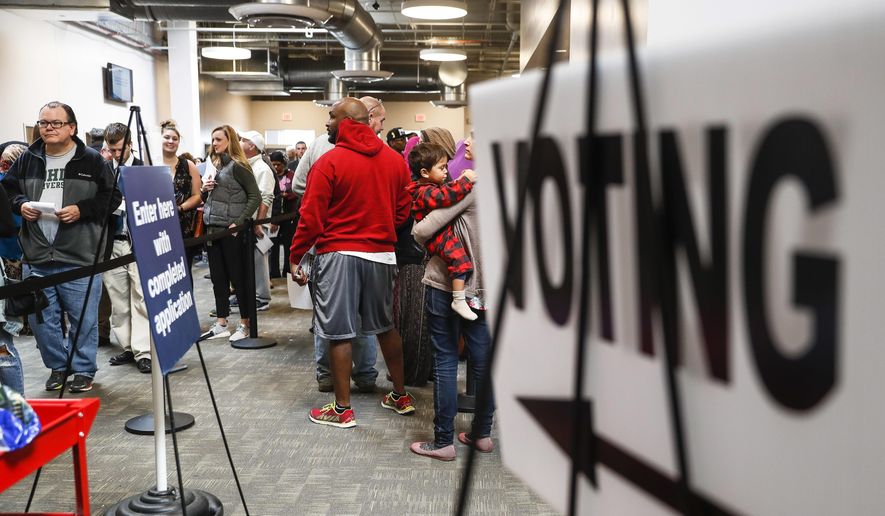The Justice Department reversed course this week to support Ohio’s efforts to purge its voter rolls, backing the state’s disputed practices in a high-profile case set to be heard this fall by the Supreme Court.
Department lawyers said in a brief filed with the court that since President Trump took office they’ve reevaluated the case and concluded the National Voter Registration Act does not prohibit rules like those used in Ohio to remove thousands of voters from the state’s voting rolls after the state deemed them “inactive.”
Ohio has been sending notices to voters who didn’t cast ballots during a two-year period to inquire whether they had moved, died or otherwise become ineligible to vote. If those registered voters did not respond to the notices or failed to cast a ballot over the next four years, they could be removed from the state’s voter rolls.
Voting-rights advocates said the National Voter Registration Act, a 1993 federal law usually dubbed “Motor-Voter,” doesn’t allow states to strip out infrequent voters without more proof.
The Trump Justice Department acknowledged the law, but said it still allows some flexibility and Ohio is within the rules.
“The NVRA eliminated the practice of removing nonvoters without notice and required States to use more protective notice procedures,” government lawyers wrote in their new brief. “But the legislative history indicates that Congress did not require States to abandon entirely the widespread practice of treating nonvoting as an indication that a registrant may have become ineligible.”
That’s a reversal from during the Obama administration, when the Justice Department sided with advocates and against Ohio when the case went to the 6th U.S. Circuit Court of Appeals. Then, the department said a state “must have reliable evidence that the voter has moved” before removing someone from the rolls.
Declining to vote did not provide such evidence, the department had argued.
The appeals court ruled that Ohio’s process is too strict and found that the notification Ohio sends out to those it wants to remove from its books isn’t compliant with federal law.
But voting rights groups say the about-face from the Justice Department could lead to purges in other states.
“The law hasn’t changed since the Department accurately told the Court that Ohio’s voter purge was unlawful. The facts haven’t changed. Only the leadership of the Department has changed,” said Kristen Clarke, president and executive director of the Lawyers’ Committee for Civil Rights Under Law. “The Justice Department’s latest action opens the door for wide-scale unlawful purging of the voter registration rolls across our country.”
Since 2011, the state has purged approximately 2 million people from the voter rolls and lawmakers are concerned the purges were a partisan tactic.
Rep. Tim Ryan, Ohio Democrat, noted that in major cities like Cleveland, Columbus and Cincinnati, voters were removed from the rolls in Democratic-leaning neighborhoods at about twice the rate as in Republican-leaning neighborhoods.
“The Department of Justice should be dedicated to preserving and expanding the right of every eligible citizen to vote,” Mr. Ryan said in a statement. “Under President Trump, the Justice Department has sanctioned the state of Ohio’s efforts to wrongfully strip Ohioans of their right to participate freely in the electoral process.”
Ohio Secretary of State Jon Husted, meanwhile, cheered the Justice Department’s new stance.
“This case is about maintaining the integrity of our elections, something that will be harder to do if elections officials are not be able to properly maintain the voter rolls,” Mr. Husted said.
Conservative legal interest groups such as the American Civil Rights Union, Judicial Watch and the Landmark Legal Foundation joined a group of 17 state attorneys general in supporting Ohio’s claims.
The Supreme Court said in May that it would hear the case in its next term, which begins in October. Those on both sides are watching for indications of how much leeway the justices will give states to cull their voter lists.
The Trump administration argues they are littered with duplicate names and noncitizens, leading to fraud.
Mr. Trump established a voter integrity commission to investigate fraud and barriers to voting. The commission has been controversial, with Democrats saying there is no widespread evidence of fraud and that the investigation is a waste of time.
The commissions has run into problems getting access to voter registration data. A number of states have balked at sharing their voter data with the commission — even though many of them make the same information available for purchase by campaigns, political parties, researchers or even the general public.
• Andrea Noble can be reached at anoble@washingtontimes.com.




Please read our comment policy before commenting.